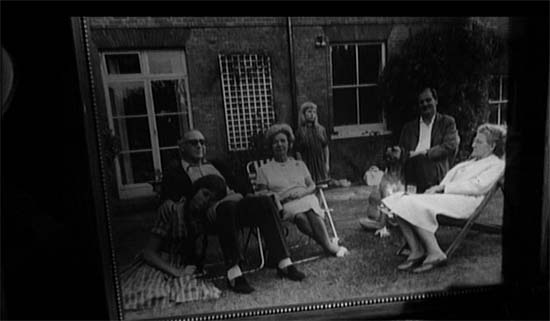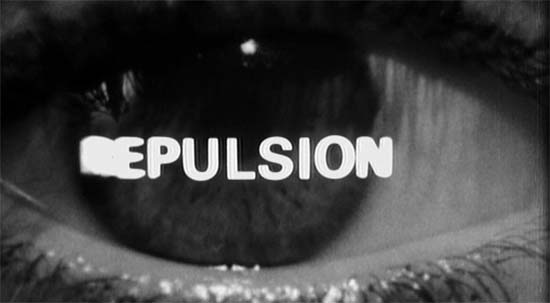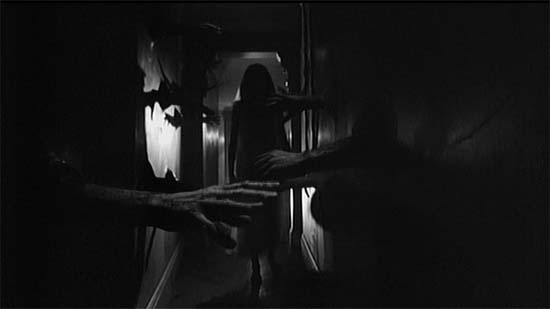 As Repulsion begins, the viewer is inclined to feel sympathetic toward Carol (Catherine Deneuve), a young French woman living in London with her older sister Helen (Yvonne Furneaux). She might seem a bit detached, but she’s lost in a jungle, albeit a perfectly ordinary one. Construction workers leer at her. She daydreams at her salon job, while her client prattles on boorishly. Her would-be boyfriend pressures her toward an intimacy for which she’s not prepared (and may never be). Her sister Helen brings over a married man, and has loud sex upstairs; he leaves his toothbrush resting in Carol’s drinking glass. Roman Polanski delivers these common dilemmas with an exaggerated intensity. The nuisances might be ordinary, but Carol is not.
As Repulsion begins, the viewer is inclined to feel sympathetic toward Carol (Catherine Deneuve), a young French woman living in London with her older sister Helen (Yvonne Furneaux). She might seem a bit detached, but she’s lost in a jungle, albeit a perfectly ordinary one. Construction workers leer at her. She daydreams at her salon job, while her client prattles on boorishly. Her would-be boyfriend pressures her toward an intimacy for which she’s not prepared (and may never be). Her sister Helen brings over a married man, and has loud sex upstairs; he leaves his toothbrush resting in Carol’s drinking glass. Roman Polanski delivers these common dilemmas with an exaggerated intensity. The nuisances might be ordinary, but Carol is not.

One of the most intensely subjective films ever made, Repulsion is perfect fodder for Polanski, whose typical obsession with details mirrors that of his protagonist. In the opening scenes his camera lingers on moments which any other filmmaker might disregard: nuns throwing a ball around in a fenced-off yard outside Carol’s window, the potatoes on the sill, the awkward little accommodations one must make when sharing the house with an unwanted houseguest, the particularly gruesome-looking skinned rabbit that Helen leaves in the refrigerator. Repulsion is an accumulation of details, and those details, which repeat, become more sinister as the film progresses, and begin to lapse into the realm of paranoid hallucination.
 Yes, the film progresses, but there isn’t really a plot. Carol and Helen are two sisters from Brussels sharing a London flat. Helen’s having an affair with a married man, and decides to have an extended vacation with him in Italy. She leaves Carol alone in the apartment, but it quickly becomes apparent that the child-like Carol is not accustomed to independence, and relied fully upon her sister. Left alone, she begins to abandon her reponsibilities–she doesn’t show up at her job for days, and seems surprised that she’s been missed–and gradually has fantasies, first that there’s an intruder in her apartment, and eventually that he rapes her every night. These rape scenes anticipate the famous dream sequence of Polanski’s masterpiece Rosemary’s Baby, as the soundtrack contains only the real-world ambience of a ticking clock–likely the clock ticking in her bedroom while she sleeps. But the ticking is also played during a scene in which she is genuinely assaulted, and responds with sudden violence. She thinks the walls are splitting apart; early in the film she comments upon a crack in the wall, and her sister barely regards her, but later, as her hallucinations intensify, the cracks grow so wide that the entire building seems to be toppling about her. In Repulsion‘s most indelible moment, arms reach out of the walls to grasp at her as she walks by. George Romero later borrowed this idea for a dream sequence in Day of the Dead, but it has a more organic logic in Polanski’s film, for Carol’s greatest terror is of being touched, and she sees the world as a predatory one in which everyone wants to touch and harm her. Polanski takes his motifs–cracks in the wall, the skinned rabbit, leering men, closed windows–and repeats them over and over, riffing like the jazz music that dominates the soundtrack. Does the story truly progress or does it just accumulate, until it finally reaches a cacophony, clashing cymbals, and Carol’s actions begin to claim victims just as her inner world, her personal, private horror movie, begins merging with the outer one?
Yes, the film progresses, but there isn’t really a plot. Carol and Helen are two sisters from Brussels sharing a London flat. Helen’s having an affair with a married man, and decides to have an extended vacation with him in Italy. She leaves Carol alone in the apartment, but it quickly becomes apparent that the child-like Carol is not accustomed to independence, and relied fully upon her sister. Left alone, she begins to abandon her reponsibilities–she doesn’t show up at her job for days, and seems surprised that she’s been missed–and gradually has fantasies, first that there’s an intruder in her apartment, and eventually that he rapes her every night. These rape scenes anticipate the famous dream sequence of Polanski’s masterpiece Rosemary’s Baby, as the soundtrack contains only the real-world ambience of a ticking clock–likely the clock ticking in her bedroom while she sleeps. But the ticking is also played during a scene in which she is genuinely assaulted, and responds with sudden violence. She thinks the walls are splitting apart; early in the film she comments upon a crack in the wall, and her sister barely regards her, but later, as her hallucinations intensify, the cracks grow so wide that the entire building seems to be toppling about her. In Repulsion‘s most indelible moment, arms reach out of the walls to grasp at her as she walks by. George Romero later borrowed this idea for a dream sequence in Day of the Dead, but it has a more organic logic in Polanski’s film, for Carol’s greatest terror is of being touched, and she sees the world as a predatory one in which everyone wants to touch and harm her. Polanski takes his motifs–cracks in the wall, the skinned rabbit, leering men, closed windows–and repeats them over and over, riffing like the jazz music that dominates the soundtrack. Does the story truly progress or does it just accumulate, until it finally reaches a cacophony, clashing cymbals, and Carol’s actions begin to claim victims just as her inner world, her personal, private horror movie, begins merging with the outer one?
Repulsion is one damn unsettling film. I have seen it several times before, but this most recent viewing left me feeling more isolated and unnerved than ever. It is the first film in an informal “apartment” trilogy, followed by Rosemary’s Baby and the underrated The Tenant, which stars Polanski himself as the one being driven insane by apartment life. To this you could potentially add The Pianist, for its long stretch with Adrian Brody trapped inside an apartment, unable to visit the world outside and at the mercy of his “protectors.” Even Polanski’s most recent film, The Ghost Writer, fits the theme, as Ewan McGregor’s author is forced to interpret the outside world from tight confines. Appropriately, Polanski edited the film while under house arrest. His world is an almost unbearably claustrophobic one, but it’s a privilege to experience it.










